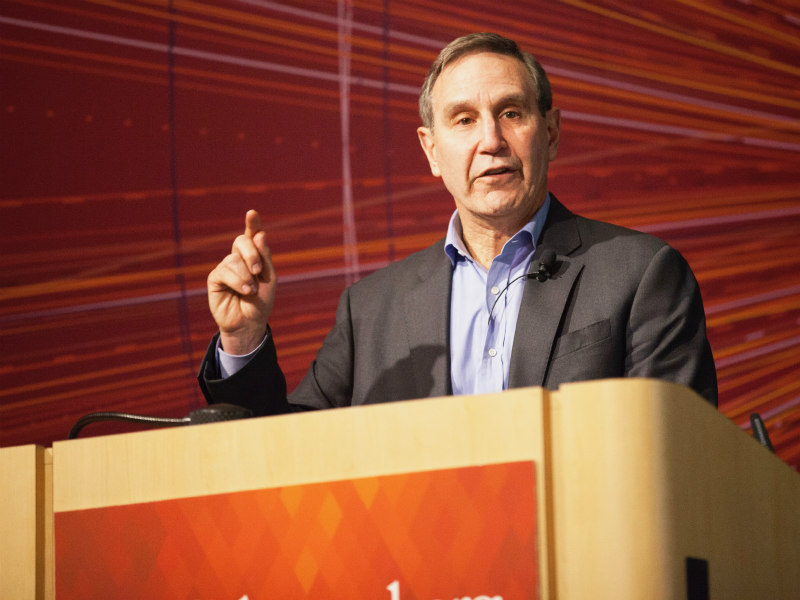Paul Holmes 13 Apr 2018 // 3:57AM GMT

LOS ANGELES — Public relations people need to recognize a new role in providing “high quality information direct to end-user,” creating a world in which “every company should become its own media company,” Edelman chief executive Richard Edelman told an audience at the University of Southern California’s Annenberg School this evening.
Delivering the Kenneth Owler Smith memorial lecture, Edelman focused on “The Rise of the Chief Change Officer” and called for public relations activities in this new era to be built around a commitment to accuracy, transparency and open exchange.
“A confluence of events has brought to the world a Battle for Truth, in which we no longer share common facts and are unable to have rational debate,” Edelman told the professionals and students in attendance, warning that “nations become vulnerable to populism and volatility when the media’s role as the guardian of community values and watchdog over the powerful is weakened.”
Edelman pointed to several events in the last decade that have weakened trust in the core institutions of business, government, media and civil society. “The first wave of the trust tsunami was the onset of globalization in the 90s, which took jobs overseas and led to de-industrialization. The second wave was the Great Recession, as 13 million Americans lost their homes and countless others their place in the American Dream. The third wave is the growing fear of immigrants, as wars and political instability prompt mass migration.
“The fourth wave, subtle and steady, is automation, responsible for four of five jobs lost in America. And the Age of Disinformation, the fifth wave, is the most insidious of all, undermining our capacity to distinguish between truth and lie.”
He cited several findings from the 2018 Edelman Trust Barometer that he said “should give every citizen pause”:
- Media is now the least-trusted institution in global governance for the first time. It has particularly low trust in Western democracies. Trust in media is high only in Asia, in countries such as China where government and media are closely aligned.
- Media is seen as politicized, elitist, biased, chasing clicks, ignoring average people and too depressing to read. As a result, 50 percent globally and 55 percent in the US have opted to not use mainstream media at all in any given week.
- There is a massive trust gap developing between social media and mainstream platforms. The problems of fake news and Russian interference in social media have prompted a collapse of trust, leaving social platforms 40 points below mainstream media.
- Six in 10 of those we surveyed said that they cannot distinguish between real news and fake news, and seven in 10 are worried about fake news being used as a weapon. As a result, 60 percent say they cannot judge the performance of public officials or even which brands to use.
In this environment, “Business is expected to be the agile and inventive player, filling a void left by a paralyzed or ineffectual government. CEOs are speaking up, becoming public advocates on issues relevant to their employees, such as gender in the workplace or immigration reform.” The most-trusted institution in global governance is now ‘my employer,’ at 79% in the US.
“We have relied to date upon media to be our primary information channel and source of truth. In a world of weakened media, we must now recognize our new role as principal, not agent. We must provide high quality information direct to end-user. This is a responsibility that we should welcome, accepting the necessity of accuracy and accountability. We want to educate to enable better decisions. Our aim is to supplement mainstream journalism, which should still be the primary means of objective fact-gathering and dissemination.”
As a result, “every company should become its own media company, what we at Edelman call ‘Collaborative Journalism.’ It should be a news operation that speaks directly to end-user of information through its corporate channels and through social media. Our tone should be natural and authentic, our format both long-form for substance and short-form with visuals for sharing. And employees should be the primary targets.”
For this to succeed, he said “we need a high and publicly stated ethical standard” and suggested four practical steps:
1. Accuracy — We must provide factually rigorous, journalistic-quality information. We should move from advocacy to education, to provide both sides of an issue.
2. Transparency — We must be accountable for what we promote, the strategies we use and the information we share. It is not only what we do but how we do it that should be visible to the public.
3. Open Exchange — As part of the company platform, there should be a place for running commentary by employees and customers, a transparent effort to surface issues and a timeline for solutions.
4. Online Ethics Training — Everyone must learn best practices and have promotions or bonuses tied to successful completion of the course.
As a result of all this, Edelman says, “We are observing the move of CCO to a broader role as advocate for change, the Chief Change Officer. Sue Garrard, CCO of Unilever, is now also responsible for the sustainability strategy for the company. David Kamenetsky of AB InBev oversees corporate strategy and sustainability. Andy Pharoah, vice president of corporate affairs and strategic initiatives at Mars, is responsible for sustainable solutions and international partnerships. This is moving the function to evolving how business is done.”
As the role of internal communications executives evolves, so too will the role of the PR firm Edelman says.
“The real job of the communications firm must be to bring ideas to clients that are consistent with the new aspirations of business. We should be the ones with the creative spark that starts movements, to bring purpose to each brand and to solve big problems in society.”
However, Edelman also noted during his speech that recent holding company moves to merge agencies are not a "stirring endorsement" of the PR industry, which remains challenged by cutbacks in communications budgets and CPG spending.


































.jpg)




.tmb-135x100.jpg)



.tmb-135x100.jpg)








